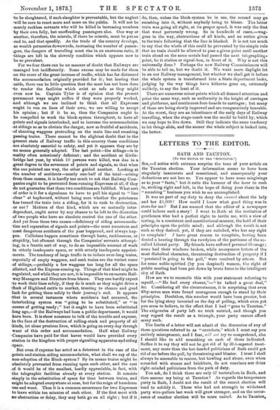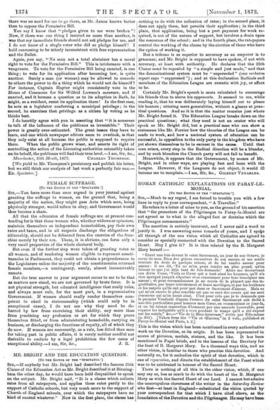LETTERS TO THE EDITOR.
BATH AND TAUNTON.
[TO THE EDITOR OF TH8 "SPECTATOR:1
notice with extreme surprise the tone of your article on the Taunton election. Your information seems to have been singularly inaccurate and sensational, and consequently your deductions are not less so. You appear to have some misgivings as to your "facts," but it suits the humour of the hour to rush in, striking right and left, in the hope of doing your share in the " smashing " business you wish to see accomplished.
It was no part of my duty to deny the canard about the lady and her £1,000! How could I know what good thing was in store for me? But I am amazed that the editor of a newspaper could believe such a story! I went to Bath at the invitation of gentlemen who had a perfect right to invite me, with a view of testing, in a consistent and constitutional manner, the hold of their principles upon the public mind ; and although the result is not such as they desired, yet, if they are satisfied, who has any right to complain? I have great reason to complain, having been denied a hearing through the rowdyism of the partisans of the so-
called Liberal party. My friends have suffered personal ; some had their windows broken, while anonymous letters of the most diabolical character, threatening destruction of property if I "persisted in going to the poll," were received by others. But for some noble-spirited (by you despised) women, the right of public meeting had been put down by brute force in the intelligent city of Bath.
How are we to reconcile this with your statement referring to myself,—" He had every chance,"—" he talked a great deal," &c. Considering all the circumstances, it is surprising that even fifty-seven men were found courageous enough to stand by their principles. Doubtless, this number would have been greater, but for the lying story invented on the day of polling, which even yet you seem to believe, to the effect that I had "gone to Taunton." The exigencies of party left no trick untried, and though you may regard the result as a triumph, your party cannot afford many such.
The limits of a letter will not admit of the discussion of any of those questions referred-to as "crotchets," which I must say you entirely misrepresent, and I fear, will not try to comprehend, else I should like to add something on each of those indicated. Suffice it to say they will not be got rid of by ill-tempered treat- ment, any more than the hot-headed politicians of Bath could get rid of me before the poll, by threatening and bluster. I trust I shall always be amenable to reason, but howling and abuse, even when seconded with stones and brickbats, do not convince nor deter right-minded politicians from the path of duty.
there was no need for me to go there, as Mr. James knows better than to oppose the Permissive Bill.
You say I know that "pledges given to me were broken "! Now, if there was one thing I insisted on more than another, it was that my immediate friends should not ask pledges for me, and I do not know of a single voter who did so pledge himself ! I hold canvassing to be utterly inconsistent with free representation and the Ballot.
Again, you say, "No man not a total abstainer has a moral right to vote for the Permissive Bill." This is intolerance with a vengeance. To vote for the Permissive Bill being enacted, is one thing ; to vote for its application after becoming law, is quite another. Surely a man (or woman) may be allowed to concede to others the power to do a thing which he would not do himself ? For instance, Captain Hayter might consistently vote in the House of Commons for Sir Wilfrid Lawson's measure, and if enacted, and it became a question as to its adoption in Bath, he might, as a resident, resist its application there ! In the first case, he acts as a legislator conferring a municipal privilege ; in the second, he exercises that privilege as a citizen by voting as he thinks best.
I do heartily agree with you in asserting that "it is nonsense to talk of the influence of the publicans as irresistible." Their power is greatly over-estimated. The great lawn they have to learn, and one which newspaper editors seem to overlook, is that they only exist at all because the public is supposed to require them. When the public grows wiser, and asserts its right of controlling the action of the Licensing authorities ostensibly taken on its behalf, the publicans will find their true level.—I am, Sir, &c.,
[We yield to Mr. Thompson's persistency and publish his letter, but we still think our analysis of last week a perfectly fair one.— En. Spectator.]



































 Previous page
Previous page